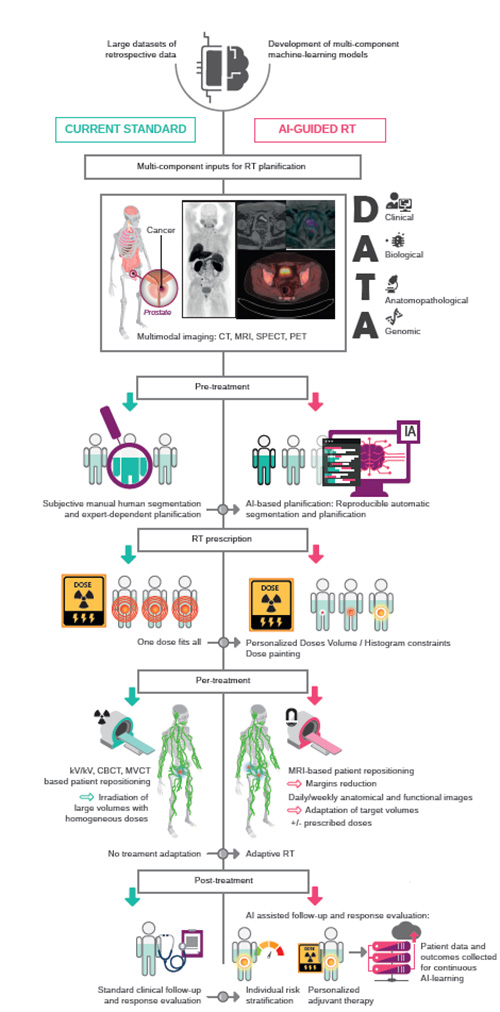ImmunoRadAI
This group belongs to the UMR 1030 Molecular Radiotherapy and Novel Therapeutics
- Radiotherapy is the second most used treatment to fight cancer after surgery. Ionising radiation has always been used to treat cancer by killing tumour cells, in particular by inducing DNA damage. This view of radiotherapy as a simple cytotoxic agent has changed dramatically in recent years, and it is now widely accepted that radiotherapy can profoundly redirect the tumour environment by modulating the immune response. Our projects aim at a better understanding of the effects of radiotherapy on the immune system, with the objective of combining it with immunomodulating agents to increase therapeutic efficacy.
- Radiotherapy doses are prescribed today in an almost identical way for all patients without taking into account all their personal specificities. The projects we are conducting aim to define, using multiple data (images, biopsies, genome), the response to conventional treatment of each patient based on artificial intelligence models. The objective is to determine, in the long term, the prescription and the method of dose delivery that will maximize the chances of response.
Current research
The ImmunoRadIA research team is a multidisciplinary team composed of biologists, engineers, physicists and physicians. The team's work is focused on two main research areas: biology and artificial intelligence applied to radioimmunotherapy.
The main objective of the first axis is to improve the effectiveness of radiotherapy by modulating the immune response. The research group aims to decipher in vivo the recruitment and role of immune cells in irradiated tumours using relevant preclinical models. A better understanding of the immune mechanisms of response to radiotherapy allows the development of new treatment strategies, based on the combination with immuno-modulating molecules. Collaboration with various industrial partners (both "big pharma" and innovative start-ups) gives the research group access to the most recent molecules. In addition, the analysis of the modulation of the immune response can also allow the identification of biomarkers of response to radiotherapy and immunotherapy. Part of the group's research efforts are also dedicated to understanding the effects of irradiation on healthy tissue, with the aim of reducing the toxicities associated with radiotherapy.
The second axis is dedicated to artificial intelligence. Its overall objective is to optimize the use of multicomponent data (clinical, biological, genomic, imaging, and anatomopathological data) in order to personalize treatments combining radiotherapy +/- immunotherapy. To this end, studies are conducted at different stages of the patient's journey. Initially, at diagnosis, the aim is to identify patients who do not respond favourably to standard therapy at an early stage. Secondly, the aim is to develop tools to facilitate the automation, reproducibility and precision of radiotherapy treatment planning. In this same step, our objective is also to make the best use of the information contained in multimodal images (PET, CT, MRI) in order to predict the local or loco-regional evolution of the disease and thus to set up personalized heterogeneous irradiations that can be potentially adapted during treatment. Finally, we are particularly invested in ongoing clinical trials combining radiotherapy and immunotherapy in which our objective is to understand the correlations between the content of medical images and the underlying biology, with a view to providing clinical and dosimetric recommendations to improve patient response to these innovative treatments. All this work is carried out thanks to the collaboration of physicians, physicists, mathematicians, computer scientists and biologists whose complementarity is essential to their success.

